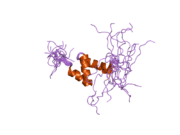USP5
| View/Edit Human | View/Edit Mouse |
Ubiquitin specific peptidase 5 is an enzyme that in humans is encoded by the USP5 gene.[3][4][5]
Interactions
USP5 has been shown to interact with TADA3L.[6]
References
- ↑ "Human PubMed Reference:".
- ↑ "Mouse PubMed Reference:".
- ↑ Puente XS, Sánchez LM, Overall CM, López-Otín C (Jul 2003). "Human and mouse proteases: a comparative genomic approach". Nature Reviews. Genetics. 4 (7): 544–58. doi:10.1038/nrg1111. PMID 12838346.
- ↑ Ansari-Lari MA, Muzny DM, Lu J, Lu F, Lilley CE, Spanos S, Malley T, Gibbs RA (Apr 1996). "A gene-rich cluster between the CD4 and triosephosphate isomerase genes at human chromosome 12p13". Genome Research. 6 (4): 314–26. doi:10.1101/gr.6.4.314. PMID 8723724.
- ↑ "Entrez Gene: USP5 ubiquitin specific peptidase 5 (isopeptidase T)".
- ↑ Rual JF, Venkatesan K, Hao T, Hirozane-Kishikawa T, Dricot A, Li N, Berriz GF, Gibbons FD, Dreze M, Ayivi-Guedehoussou N, Klitgord N, Simon C, Boxem M, Milstein S, Rosenberg J, Goldberg DS, Zhang LV, Wong SL, Franklin G, Li S, Albala JS, Lim J, Fraughton C, Llamosas E, Cevik S, Bex C, Lamesch P, Sikorski RS, Vandenhaute J, Zoghbi HY, Smolyar A, Bosak S, Sequerra R, Doucette-Stamm L, Cusick ME, Hill DE, Roth FP, Vidal M (Oct 2005). "Towards a proteome-scale map of the human protein-protein interaction network". Nature. 437 (7062): 1173–8. doi:10.1038/nature04209. PMID 16189514.
Further reading
- D'Andrea A, Pellman D (1999). "Deubiquitinating enzymes: a new class of biological regulators". Critical Reviews in Biochemistry and Molecular Biology. 33 (5): 337–52. doi:10.1080/10409239891204251. PMID 9827704.
- Falquet L, Paquet N, Frutiger S, Hughes GJ, Hoang-Van K, Jaton JC (Dec 1995). "cDNA cloning of a human 100 kDa de-ubiquitinating enzyme: the 100 kDa human de-ubiquitinase belongs to the ubiquitin C-terminal hydrolase family 2 (UCH2)". FEBS Letters. 376 (3): 233–7. doi:10.1016/0014-5793(95)01287-7. PMID 7498549.
- Wilkinson KD, Tashayev VL, O'Connor LB, Larsen CN, Kasperek E, Pickart CM (Nov 1995). "Metabolism of the polyubiquitin degradation signal: structure, mechanism, and role of isopeptidase T". Biochemistry. 34 (44): 14535–46. doi:10.1021/bi00044a032. PMID 7578059.
- Falquet L, Paquet N, Frutiger S, Hughes GJ, Hoang-Van K, Jaton JC (Feb 1995). "A human de-ubiquitinating enzyme with both isopeptidase and peptidase activities in vitro". FEBS Letters. 359 (1): 73–7. doi:10.1016/0014-5793(94)01451-6. PMID 7851534.
- Ansari-Lari MA, Shen Y, Muzny DM, Lee W, Gibbs RA (Mar 1997). "Large-scale sequencing in human chromosome 12p13: experimental and computational gene structure determination". Genome Research. 7 (3): 268–80. doi:10.1101/gr.7.3.268. PMID 9074930.
- Suzuki Y, Tsunoda T, Sese J, Taira H, Mizushima-Sugano J, Hata H, Ota T, Isogai T, Tanaka T, Nakamura Y, Suyama A, Sakaki Y, Morishita S, Okubo K, Sugano S (May 2001). "Identification and characterization of the potential promoter regions of 1031 kinds of human genes". Genome Research. 11 (5): 677–84. doi:10.1101/gr.164001. PMC 311086
 . PMID 11337467.
. PMID 11337467. - Engidawork E, Juranville JF, Fountoulakis M, Dierssen M, Lubec G (2002). "Selective upregulation of the ubiquitin-proteasome proteolytic pathway proteins, proteasome zeta chain and isopeptidase T in fetal Down syndrome". Journal of Neural Transmission. Supplementum (61): 117–30. doi:10.1007/978-3-7091-6262-0_10. PMID 11771738.
- Gabriel JM, Lacombe T, Carobbio S, Paquet N, Bisig R, Cox JA, Jaton JC (Nov 2002). "Zinc is required for the catalytic activity of the human deubiquitinating isopeptidase T". Biochemistry. 41 (46): 13755–66. doi:10.1021/bi026096m. PMID 12427038.
- Lacombe T, Gabriel JM (Nov 2002). "Further characterization of the putative human isopeptidase T catalytic site". FEBS Letters. 531 (3): 469–74. doi:10.1016/S0014-5793(02)03586-X. PMID 12435595.
- Anderson NL, Polanski M, Pieper R, Gatlin T, Tirumalai RS, Conrads TP, Veenstra TD, Adkins JN, Pounds JG, Fagan R, Lobley A (Apr 2004). "The human plasma proteome: a nonredundant list developed by combination of four separate sources". Molecular & Cellular Proteomics. 3 (4): 311–26. doi:10.1074/mcp.M300127-MCP200. PMID 14718574.
- Brandenberger R, Wei H, Zhang S, Lei S, Murage J, Fisk GJ, Li Y, Xu C, Fang R, Guegler K, Rao MS, Mandalam R, Lebkowski J, Stanton LW (Jun 2004). "Transcriptome characterization elucidates signaling networks that control human ES cell growth and differentiation". Nature Biotechnology. 22 (6): 707–16. doi:10.1038/nbt971. PMID 15146197.
- Colland F, Jacq X, Trouplin V, Mougin C, Groizeleau C, Hamburger A, Meil A, Wojcik J, Legrain P, Gauthier JM (Jul 2004). "Functional proteomics mapping of a human signaling pathway". Genome Research. 14 (7): 1324–32. doi:10.1101/gr.2334104. PMC 442148
 . PMID 15231748.
. PMID 15231748. - Rual JF, Venkatesan K, Hao T, Hirozane-Kishikawa T, Dricot A, Li N, Berriz GF, Gibbons FD, Dreze M, Ayivi-Guedehoussou N, Klitgord N, Simon C, Boxem M, Milstein S, Rosenberg J, Goldberg DS, Zhang LV, Wong SL, Franklin G, Li S, Albala JS, Lim J, Fraughton C, Llamosas E, Cevik S, Bex C, Lamesch P, Sikorski RS, Vandenhaute J, Zoghbi HY, Smolyar A, Bosak S, Sequerra R, Doucette-Stamm L, Cusick ME, Hill DE, Roth FP, Vidal M (Oct 2005). "Towards a proteome-scale map of the human protein-protein interaction network". Nature. 437 (7062): 1173–8. doi:10.1038/nature04209. PMID 16189514.
- Reyes-Turcu FE, Horton JR, Mullally JE, Heroux A, Cheng X, Wilkinson KD (Mar 2006). "The ubiquitin binding domain ZnF UBP recognizes the C-terminal diglycine motif of unanchored ubiquitin". Cell. 124 (6): 1197–208. doi:10.1016/j.cell.2006.02.038. PMID 16564012.
This article is issued from Wikipedia - version of the 5/20/2016. The text is available under the Creative Commons Attribution/Share Alike but additional terms may apply for the media files.




